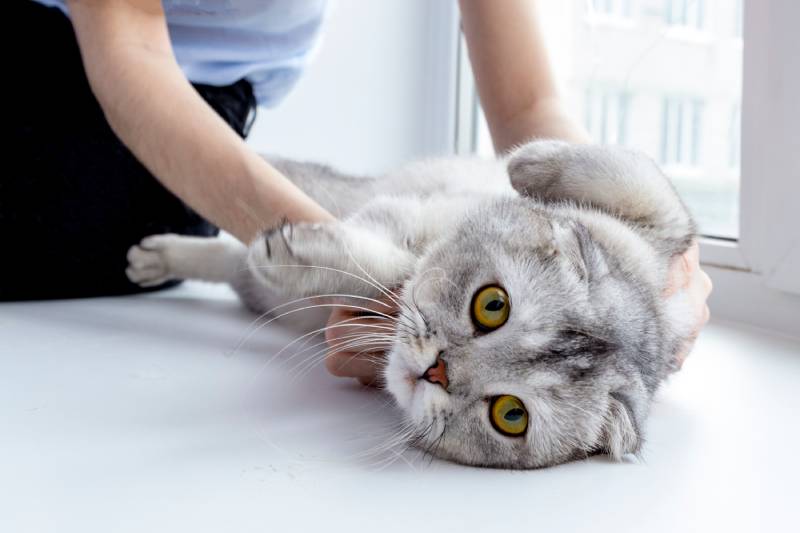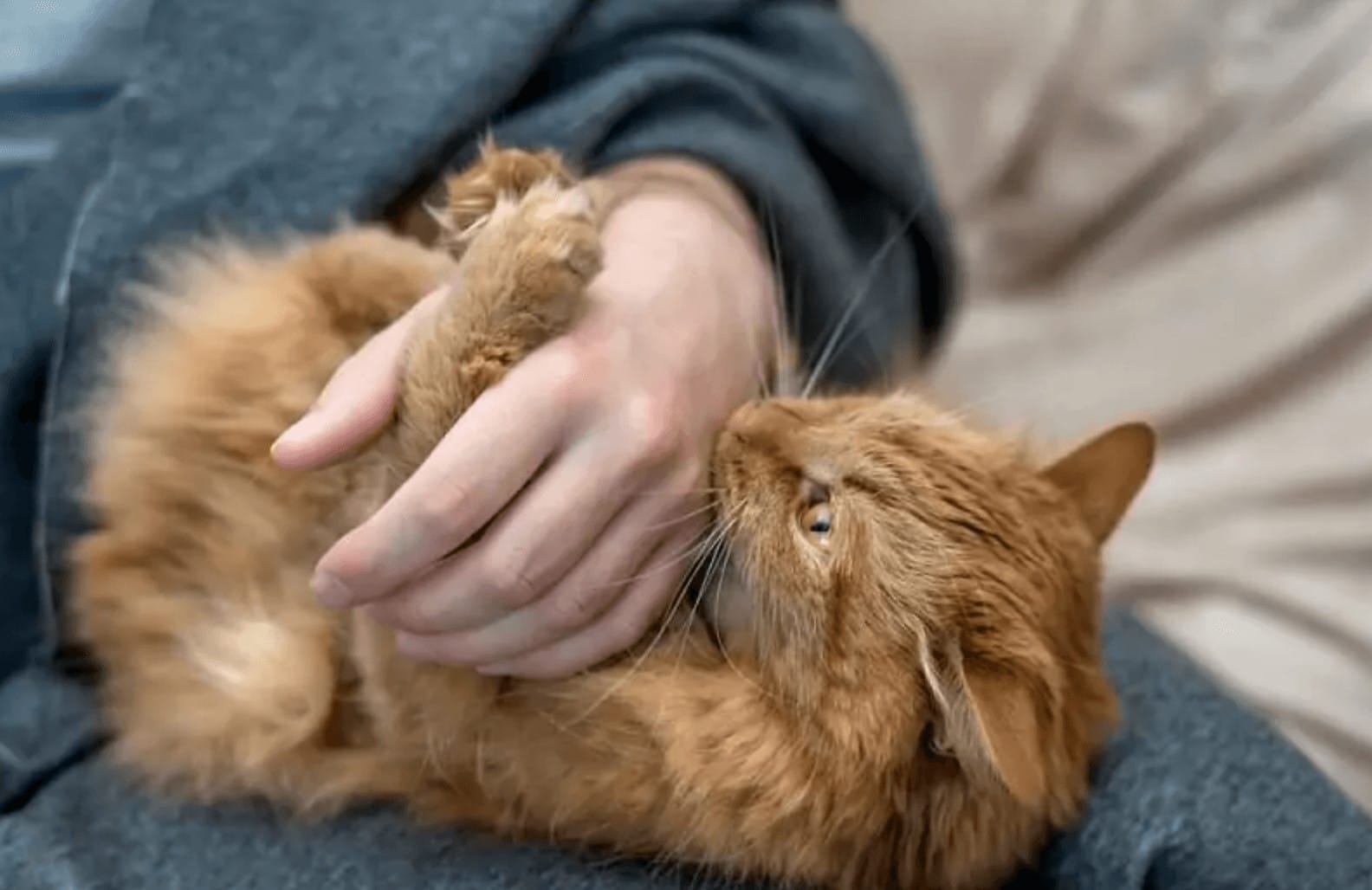
You’ve seen it happen hundreds of times: You reach out to pet your cat on “that spot” and they immediately react by twitching, purring, or even outright attacking you.
That’s a ticklish spot, right? Can cats even be ticklish?
The answer is yes—probably. We’re not 100% certain, but it definitely looks like some cats can be ticklish. However, they may not show it in the same way that humans do.
To learn how to find out if your cat is ticklish (and what it even means), read on.
Can Cats Be Ticklish?
It would help to first define what exactly we mean by “ticklish”. For humans, the word often conjures up pictures of a person doubled over in convulsive, involuntary laughter while someone manipulates a sensitive spot on their body. This is known as “gargalesis.”
But cats aren’t ticklish like that. Only humans and other primates, like gorillas, experience gargalesis.
There’s another kind of ticklish, though, called “knismesis”. Knismesis doesn’t make you laugh, and it may not be pleasurable at all. It’s more of an annoying sensation, like when you feel something crawling on you.
Cats definitely experience knismesis, and they can respond in different ways. Some purr, others wiggle, and some may even hiss or try to bite you. Many will also shudder or twitch when their ticklish spots are stimulated.
This is likely an involuntary nerve reflex, and it may serve an important purpose for your cat’s health.

Why Are Cats Ticklish?
On the face of it, it seems odd that cats would be ticklish at all. What purpose does it serve? Is it just a weird evolutionary quirk that nature forgot to program out of them?
As it turns out, many scientists think that being ticklish (and the spasming, biting, and kicking that can accompany it) may be important after all—and the reason has to do with parasites.
If you’re a cat in the wild, you may not notice when something small is crawling on you. Unfortunately, many of the tiny creepy-crawlies that like to climb on cats are parasites like ticks and fleas, and they can carry diseases or sap a cat’s blood supply to the point that they become dangerously anemic. This is especially dangerous for kittens and smaller cats.
Being able to sense and repel tiny invaders can extend a cat’s lifespan (and increase their chances of passing on their genes to future generations). So, when your cat spasms uncontrollably because you’re tickling it, that may just be their unconscious telling them that they need to try to dislodge a parasite.
If you think about it, that’s probably the reason that humans experience knismesis too. It’s your body warning you that something nasty is creeping up on you!

What Are the Most Common Ticklish Spots on Cats?
While every cat is different, certain spots seem to be ticklish more often than others. These include the feet, chin, base of the tail, cheeks, and belly.
Those are also some of the places that fleas and ticks are most likely to latch onto if they get on your cat. It makes sense that your cat would have heightened sensitivity to light touches in those areas.
However, not all these tickle spots can be solely attributed to parasites. The belly, for example, is also a prime spot where skin allergies can form, so that could be another hardwired response.
The base of the tail is a different beast entirely, especially if you have a female cat. There are a ton of scent glands in that area, and if you have an unaltered female that raises her hips when you scratch her there, it may mean she’s in heat. Alternately, raising their butt to meet your hands could be a way of marking you, so any other cat you meet instantly knows whom you really belong to.
Should You Tickle Your Cat?
Causing your cat to squirm or kick their foot uncontrollably may be amusing to you, but the chances are that it’s less fun for your cat.
Remember, when you tickle your cat, there’s a good chance that you’re convincing their unconscious mind that there’s a parasite trying to attack them. That’s not fun to think about!
Even if you don’t believe that theory, the stimulation doesn’t seem to be pleasurable. Best case scenario, it’s merely annoying, and it may cause stress or trust issues in some cats.
There’s also the risk to your own body to think about. Many cats that don’t like to be tickled will respond by biting or swiping at the tickler, and you may end up with a shredded hand as a result. It’s not worth it.
We’re not going to condemn you if you give your cat the occasional tickle (it can be pretty cute, after all). However, understand that you’re doing it for your benefit, not theirs, and if you do it too much, they might not want to be around you anymore.

If My Cat Doesn’t Like Being Tickled, Why Do They Seem to Initiate It?
All of this may fly in the face of some of your experiences. After all, why would your cat show you their belly or arch their back if they don’t enjoy being tickled?
First off, there’s no guarantee that all cats dislike being tickled. Your cat may actually like it—and you should watch their body language to determine if that’s the case. If they purr, rub up against you, or show other signs of enjoyment, then by all means, tickle on.
However, in many cases, your cat may seem to invite being tickled when that’s not what they want at all. If they show you their belly, it may simply mean that they trust you or want to play—not that they want you to tickle it. If you’re like most cat lovers, you’ve probably learned that lesson the hard way over the years.
On the other hand, they may respond positively to being tickled around their tail. But that likely has different connotations than simply enjoying a tickle.
What’s the Verdict? Are Cats Ticklish?
While the science isn’t necessarily conclusive, all data points to the fact that, yes, cats can be ticklish. However, that doesn’t mean being tickled is an enjoyable experience for them, nor does it give you carte blanche to tickle them as much as you like.
See also:
Featured Image Credit: dissx, Shutterstock






